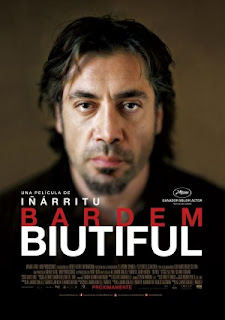Biutiful
 This season on the sit-com 30 Rock, the character played by Tracy Morgan is pursuing his dream of winning the "EGOT"--the Emmy, Grammy, Oscar, and Tony. To win an Oscar, he makes a low-budget drama called Hard to Watch. From the clips shown, the film most resembles Precious, but I couldn't help but think about it as I watched Alejandro González Iñárritu's film Biutiful, which has just picked up a nomination for Best Foreign Language Film Oscar. It is hard to watch.
This season on the sit-com 30 Rock, the character played by Tracy Morgan is pursuing his dream of winning the "EGOT"--the Emmy, Grammy, Oscar, and Tony. To win an Oscar, he makes a low-budget drama called Hard to Watch. From the clips shown, the film most resembles Precious, but I couldn't help but think about it as I watched Alejandro González Iñárritu's film Biutiful, which has just picked up a nomination for Best Foreign Language Film Oscar. It is hard to watch.Set in Barcelona, the film covers a short period of time in the life of Uxbal, who is played to the hilt by Javier Bardem (who also received an Oscar nomination). Uxbal's occupation is as something of a middle-man between a Chinese outfit that manufactures pirated handbags and the African peddlers who sell them on the street. He would seem to make a comfortable living, and has custody of two children. His ex-wife, a bipolar woman who works as a "masseuse," is still in his life.
At the beginning of the film we learn a few things about Bardem: he can make contact with the dead, and does this for money; he has far too much empathy to be in the business he's in; and he is dying of cancer. All of this swirls around a business decision he makes with his Chinese supplier to get into the human trafficking business.
Biutiful, starting with its ironic title, spends most of its running time contrasting the squalor in which Bardem operates and his more idealized pursuits, namely his children. The action bounces back between moments of cozy banality, like a birthday party for a ten-year-old girl, and a basement full of Chinese immigrants, in Spain to find jobs. All this is well and good, but I never appreciated what Iñárritu was trying to say about all this. Instead, I felt like a tourist, led by a director who could do nothing more than point and gawk at the miseries of the underclass.
Bardem is brilliant, though, and deserves a better movie. He is in a good percentage of the film, and when he's not there I could feel myself checking out. He seems to have prepared for the role by staying up for three days straight, as his eyes are almost always bloodshot. He carries the combination of empathy and world-weariness well, though, even if the script doesn't support it (the communing with the dead angle is woefully underdeveloped). This does lead to another problem, though: Bardem comes across as such a good guy it's hard to believe he could be successful in such a cut-throat world.
Biutiful makes some departures from Iñárritu's usual structure, in that it focuses on one character and is almost completely linear. The opening scenes are not, though, and we don't know what they mean until the film ends. These scenes are very evocative, as is a sequence involving a large-scale tragedy, but the moments don't add up to a satisfying whole. The whole film, for me, as a long (two-and-a-half hours) of unrelenting misery, without an underlying justification.
I give Biutiful a C, mostly for Bardem's performance.


Comments
Post a Comment